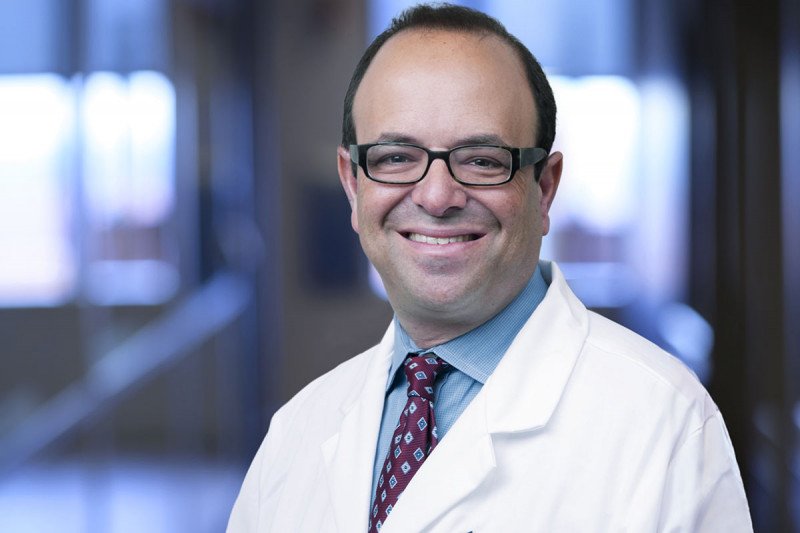
"Primary brain tumors are distinctly uncommon," says Memorial Sloan Kettering neurologist and supportive care specialist Alan Carver (pictured).
A bad headache can be a frightening experience. But sometimes, even scarier than the pounding in your head can be the tricks your mind plays on you as it’s happening.
When that throbbing pain gets unbearable, it’s easy to worry that your headache might be something more serious, like a brain tumor. But Alan Carver, a neurologist and supportive care specialist at Memorial Sloan Kettering, says that the vast majority of the time, a headache is not something to worry about.
“Primary brain tumors are distinctly uncommon,” says Dr. Carver, adding that only five per 100,000 people are diagnosed each year. “The honest truth is that most of the time headaches are not associated with brain tumors, though they can produce severe pain and other unpleasant symptoms.”
Vision problems and other symptoms like nausea, vomiting, and being sensitive to sound and light are much more likely indicators of a migraine headache than a mass in the brain, he says.
In fact, only about half of the time will a headache be what brings a person in to see a neurologist, he adds. The symptoms that more commonly suggest a mass in the brain are neurologic: difficulty speaking, weakness on one side of the body, and changes in vision, for example. A seizure is another tip-off, and it can take different forms. Some seizures can include convulsing and a loss of consciousness. Others can be a shorter period of prolonged involuntary movements.
When someone visits a neurologist, a further look at the brain with an MRI is only sometimes necessary. Dr. Carver can usually determine if a person’s headache warrants a closer look by considering a series of questions he abbreviates with the acronym SNOOP.
S: Systemic
“Systemic” refers to what is happening in someone’s body at the time of the headache. A person with a brain tumor likely has other symptoms, and sometimes a preexisting health condition.
“I want to know what else is going on,” Dr. Carver says. “Do they have a fever? Do they have some other illness like cancer or HIV? Is this person sick in some other way? If the person is a young adult and in good health other than the headache, I can often reassure him or her of the extreme unlikelihood of an underlying brain tumor.”
Back to topN: Neurologic Exam
A neurologic exam is the gold-standard test given by neurologists and emergency room doctors when someone comes in with a headache. A person with a brain tumor often has a specific neurologic issue that is visible to the naked eye. The person might drag a leg when walking, have trouble speaking, or be unable to raise their arms to equal height. Every time a person has an annual check-up, their doctor is expected to perform a short neurologic exam.
Back to topO: Onset
Many headaches that are not dangerous tend to gradually build over hours or even days. A more concerning headache comes on fast and strong, Dr. Carver says.
Back to topO: Older
A brain tumor is much more common in older adults than in young people, Dr. Carver says. “If a 22-year-old comes to see me and meets criteria for migraine, and has a normal neurological exam, is there a reason to order an MRI? Absolutely not,” he says.
Back to topP: Prior Headache History
When Dr. Carver meets with someone for an appointment, he asks if headaches have been an issue for that person in the past. That can help him determine if the headache is something out of the ordinary or if it is consistent with the person’s medical history.
“People with a prior history of headaches who are unlucky enough later in life to develop a brain tumor are more likely to complain of a headache than people without a history,” Dr. Carver says. “It is therefore especially important to examine people comprehensively to be certain that symptoms or signs aren’t missed.”
Back to topHelp at MSK
In the very unlikely event that a headache does lead to a brain tumor diagnosis, MSK is one of the top places in the world to come for care. People who have been diagnosed with brain tumors can receive comprehensive care through MSK’s brain tumor service, led by medical oncologist Ingo Mellinghoff. Together with Lisa DeAngelis, Chair of MSK’s Department of Neurology, Dr. Melinghoff and his team are able to offer many more brain tumor treatment options than previously existed and numerous opportunities for people to participate in clinical trials.
And there’s help even if the underlying problem isn’t a tumor. Dr. Carver says that we now know many underlying mechanics of migraines, which has led to successful treatment for most people with this debilitating disorder. He advises anyone with frequent and severe headaches to undergo a comprehensive exam to both assure that nothing is missed and to receive the benefits of successful treatment.
Back to top





